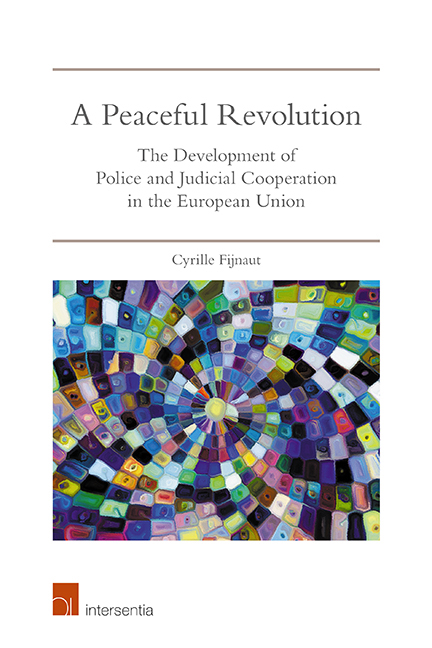Book contents
- Frontmatter
- Preface
- Contents
- List of Acronyms and Abbreviations
- Chapter 1 General Introduction
- PART I THE HISTORICAL BACKGROUND TO POLICE AND JUDICIAL COOPERATION IN THE EUROPEAN UNION
- Chapter 2 Police and Judicial Cooperation in Europe Up to the End of the Second World War
- Chapter 3 Police and Judicial Cooperation in Europe after the Second World War
- PART II THE FOUNDATION OF POLICE AND JUDICIAL COOPERATION IN THE EUROPEAN UNION
- PART III THE CURRENT STATE OF POLICE AND JUDICIAL COOPERATION IN THE EUROPEAN UNION
- Bibliography
- About the Author
Chapter 3 - Police and Judicial Cooperation in Europe after the Second World War
from PART I - THE HISTORICAL BACKGROUND TO POLICE AND JUDICIAL COOPERATION IN THE EUROPEAN UNION
Published online by Cambridge University Press: 09 November 2019
- Frontmatter
- Preface
- Contents
- List of Acronyms and Abbreviations
- Chapter 1 General Introduction
- PART I THE HISTORICAL BACKGROUND TO POLICE AND JUDICIAL COOPERATION IN THE EUROPEAN UNION
- Chapter 2 Police and Judicial Cooperation in Europe Up to the End of the Second World War
- Chapter 3 Police and Judicial Cooperation in Europe after the Second World War
- PART II THE FOUNDATION OF POLICE AND JUDICIAL COOPERATION IN THE EUROPEAN UNION
- PART III THE CURRENT STATE OF POLICE AND JUDICIAL COOPERATION IN THE EUROPEAN UNION
- Bibliography
- About the Author
Summary
INTRODUCTION
This chapter is devoted to the development of police and judicial cooperation from the end of the Second World War until the creation of the European Union with the signing of the Treaty of Maastricht in 1992. Developments during this period followed three paths: the Interpol path, the Council of Europe path and the European Community path. This chapter discusses each of these paths in turn. A thorough knowledge of events in Europe in relation to the relevant organisations during this period is essential for a clear understanding of how police and judicial cooperation evolved in the European Union, as will become fully apparent in the succeeding chapters.
The first section is devoted to the history of Interpol during the post-war period and starts with a description of the circumstances surrounding the re-establishment of the International Criminal Police Commission under a new name, the International Criminal Police Organisation (ICPO-Interpol, hereinafter Interpol) in 1946. That is followed by a discussion of the reasons why, despite the remarkably rapid resumption of its activities, the organisation reached an impasse in the 1970s. The third part of the section explains why the regionalisation of Interpol in Europe failed to resolve the deadlock. The fourth and final part describes how the globalisation of Interpol after the American and British police had seized control did ultimately provide something of a solution.
The second section discusses the part played by the Council of Europe – on the basis of its objectives as laid down in the statute of 5 May 1949 – in the development of cross-border police and judicial cooperation in Europe during this period. The section starts with a review of the substance and significance of the series of conventions on mutual assistance in criminal matters and the efforts made to enhance police cooperation, particularly in response to organised crime. This is followed by a review of the impact that the European Convention for the Protection of Human Rights and Fundamental Freedoms (hereinafter: ECHR) of 4 November 1950 had directly – via the case law of the European Court of Human Rights – and indirectly – via special treaties to enforce the implementation of and compliance with articles 3 and 8 – on the development of this form of interstate cooperation during the post-war period.
- Type
- Chapter
- Information
- A Peaceful RevolutionThe Development of Police and Judicial Cooperation in the European Union, pp. 63 - 142Publisher: IntersentiaPrint publication year: 2019



